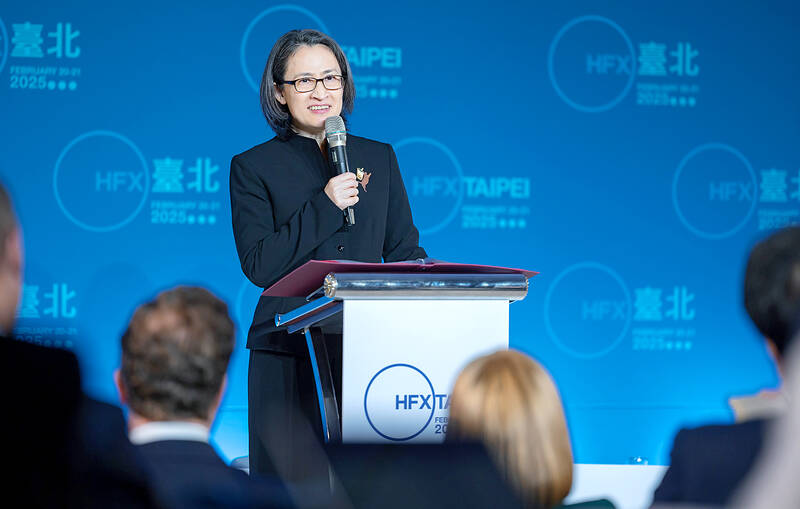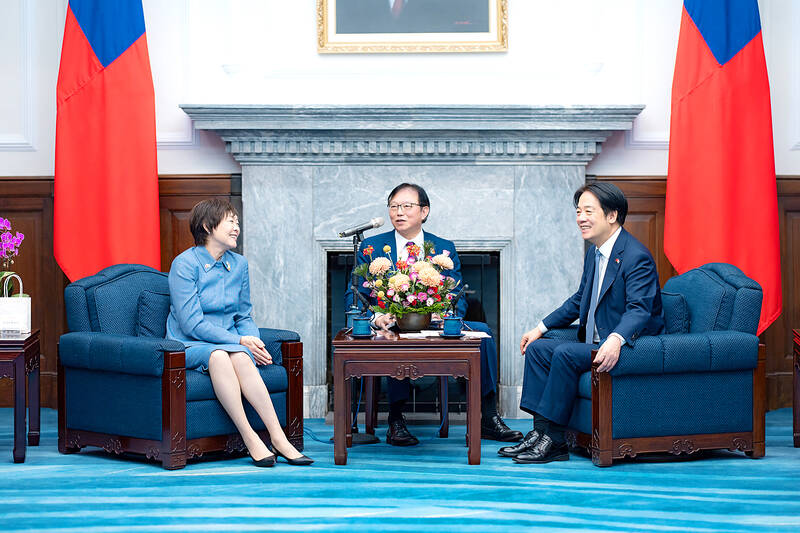Vice President Hsiao Bi-khim (蕭美琴) yesterday emphasized Taiwan’s commitment to defending itself in a call for the nation’s allies and like-minded partners to preserve global peace and prosperity.
To invest in Taiwan’s capabilities is to invest in peace, she told this year’s Halifax International Security Forum in Taipei in a closing speech.
Taiwan is a small nation, but the Taiwanese ethics of hard work, innovation and resilience can be wielded to extraordinary effect as a force for justice and progress, she said, adding that the nation is indispensable to peace and stability in the Indo-Pacific region.

Photo: screen grab from the Presidential Office’s Flickr
The nation’s hosting of the event showed that people from around the world could come together to rally in defense of their shared values, she added.
The forum’s participants share a firm belief in the democratic system of government’s importance to human rights, economic prosperity and international peace, Hsiao said.
Yet, tragedies and conflicts afflict the world every day, she said, adding that leaders cannot afford to be complacent, and must remain cautious and strive to do better with a sense of urgency.

Photo: screen grab from the Presidential Office’s Flickr
Taiwan has increased its defense spending, strengthened the training and capabilities of military reserves, and obtained better weapons systems for its armed forces, Hsiao said.
Concurrently, the nation has made use of Taiwanese innovation and the capabilities of the private sector to enhance national security, she said.
Taiwan has taken a precise and specific approach to bolster its ability to defend itself against the nation’s most significant threat, the Chinese Communist Party and its People’s Liberation Army, she said.
China frequently intrudes into Taiwan’s air defense identification zone, and conducts cyberattacks against the nation in a bid to undermine Taiwanese confidence in the government and democratic institutions, Hsiao said.
Beijing’s “gray zone” tactics conducted across multiple domains require a multidomain response from a determined nation, she said.
President William Lai’s (賴清德) Whole-of-Society Defense Resilience Committee has been established to augment the nation’s civil defense, response to natural disasters and economic resilience, Hsiao said.
Taiwan has observed global geopolitical changes that have called for a renewed focus on defending its values and turning the current crisis into an opportunity, she said.
Meanwhile, Akie Abe, wife of the late Japanese prime minister Shinzo Abe, also spoke at the forum, saying that holding the event in Taiwan is an act that holds special meaning amid the current period of international turmoil.
Citing her late husband, Akie Abe reiterated that a Taiwan contingency is a Japan contingency, and that peace in the Taiwan Strait is crucial to the region, adding that Shinzo Abe’s love of peace carries an important message to the world.
Separately, Lai yesterday also met with Akie Abe at the Presidential Office to thank her for Shinzo Abe’s ideals, and contributions to regional peace and prosperity, and called for the continued support of the nation’s friends and allies.
Additional reporting by Su Yung-yao

Authorities have detained three former Taiwan Semiconductor Manufacturing Co (TMSC, 台積電) employees on suspicion of compromising classified technology used in making 2-nanometer chips, the Taiwan High Prosecutors’ Office said yesterday. Prosecutors are holding a former TSMC engineer surnamed Chen (陳) and two recently sacked TSMC engineers, including one person surnamed Wu (吳) in detention with restricted communication, following an investigation launched on July 25, a statement said. The announcement came a day after Nikkei Asia reported on the technology theft in an exclusive story, saying TSMC had fired two workers for contravening data rules on advanced chipmaking technology. Two-nanometer wafers are the most

NEW GEAR: On top of the new Tien Kung IV air defense missiles, the military is expected to place orders for a new combat vehicle next year for delivery in 2028 Mass production of Tien Kung IV (Sky Bow IV) missiles is expected to start next year, with plans to order 122 pods, the Ministry of National Defense’s (MND) latest list of regulated military material showed. The document said that the armed forces would obtain 46 pods of the air defense missiles next year and 76 pods the year after that. The Tien Kung IV is designed to intercept cruise missiles and ballistic missiles to an altitude of 70km, compared with the 60km maximum altitude achieved by the Missile Segment Enhancement variant of PAC-3 systems. A defense source said yesterday that the number of

A bipartisan group of US representatives have introduced a draft US-Taiwan Defense Innovation Partnership bill, aimed at accelerating defense technology collaboration between Taiwan and the US in response to ongoing aggression by the Chinese Communist Party (CCP). The bill was introduced by US representatives Zach Nunn and Jill Tokuda, with US House Select Committee on the Chinese Communist Party Chairman John Moolenaar and US Representative Ashley Hinson joining as original cosponsors, a news release issued by Tokuda’s office on Thursday said. The draft bill “directs the US Department of Defense to work directly with Taiwan’s Ministry of National Defense through their respective

Tsunami waves were possible in three areas of Kamchatka in Russia’s Far East, the Russian Ministry for Emergency Services said yesterday after a magnitude 7.0 earthquake hit the nearby Kuril Islands. “The expected wave heights are low, but you must still move away from the shore,” the ministry said on the Telegram messaging app, after the latest seismic activity in the area. However, the Pacific Tsunami Warning System in Hawaii said there was no tsunami warning after the quake. The Russian tsunami alert was later canceled. Overnight, the Krasheninnikov volcano in Kamchatka erupted for the first time in 600 years, Russia’s RIA